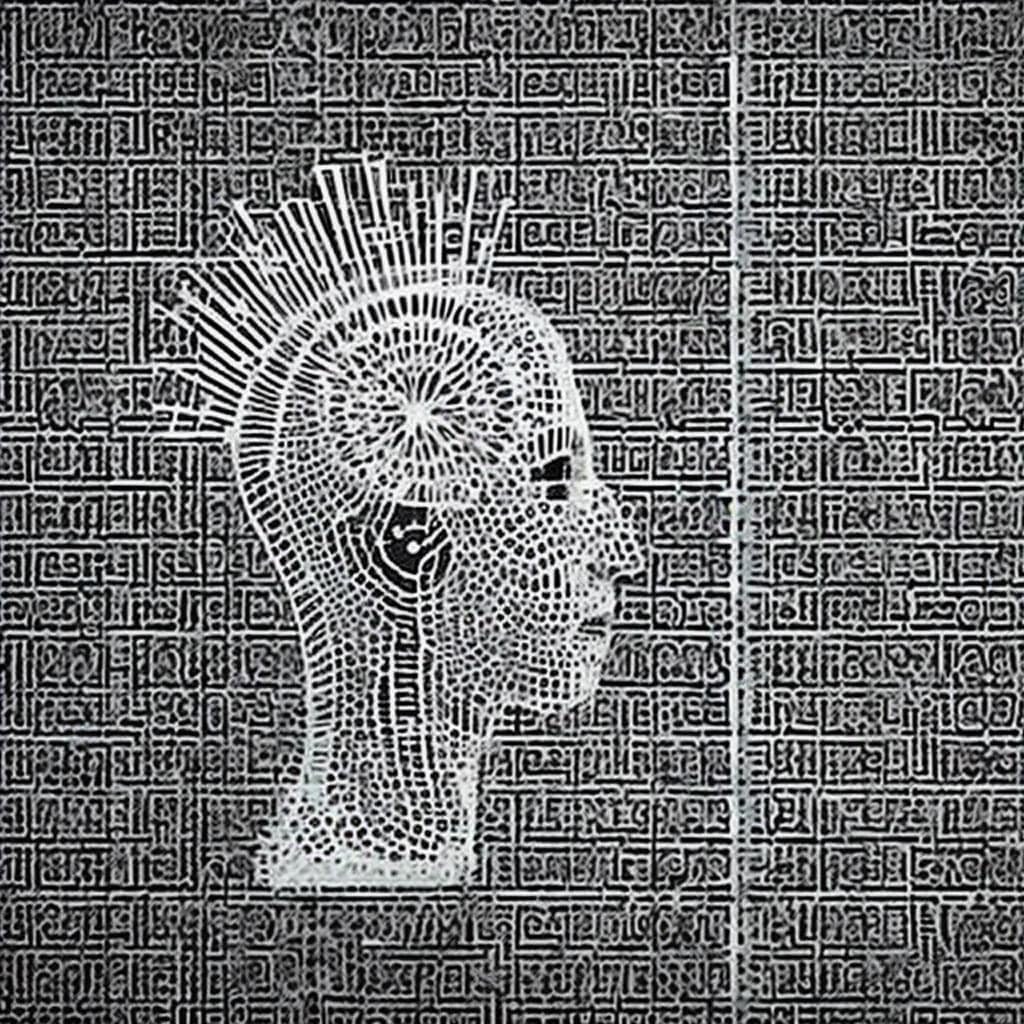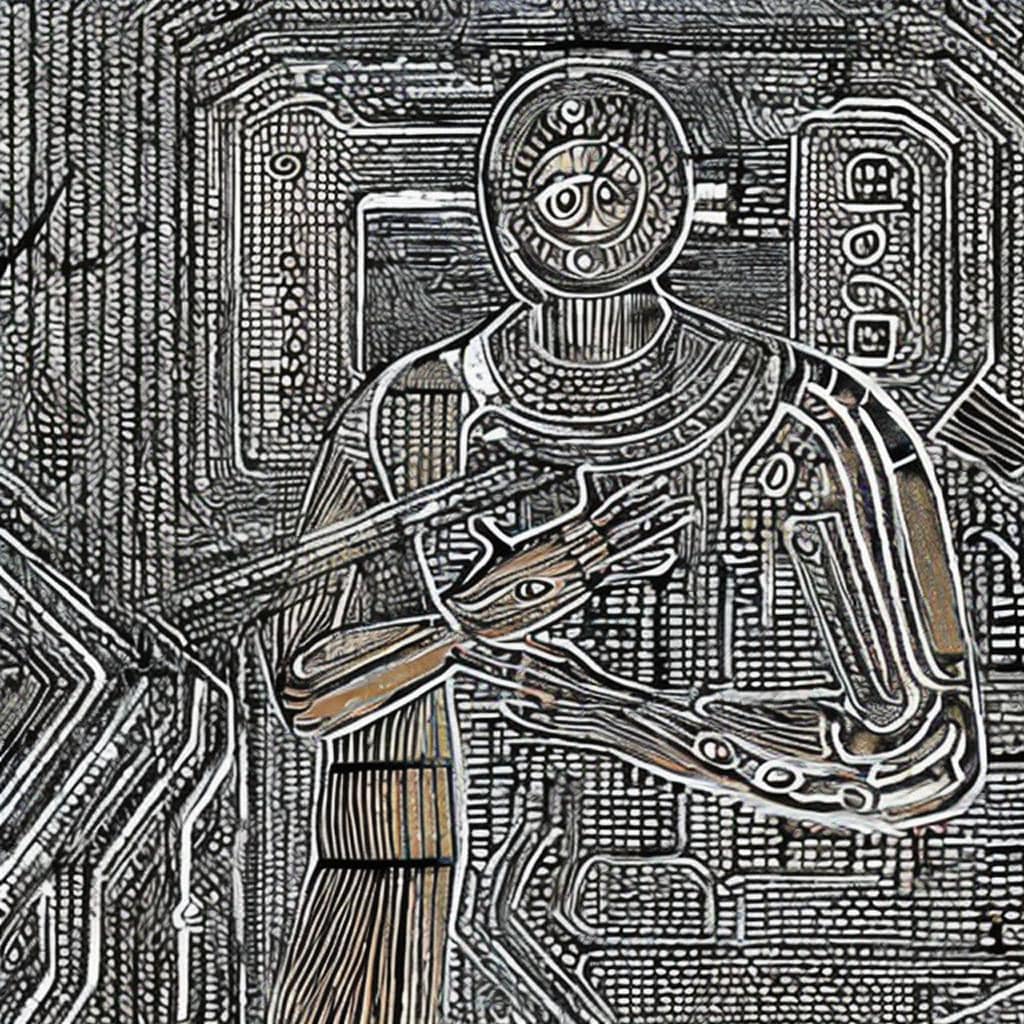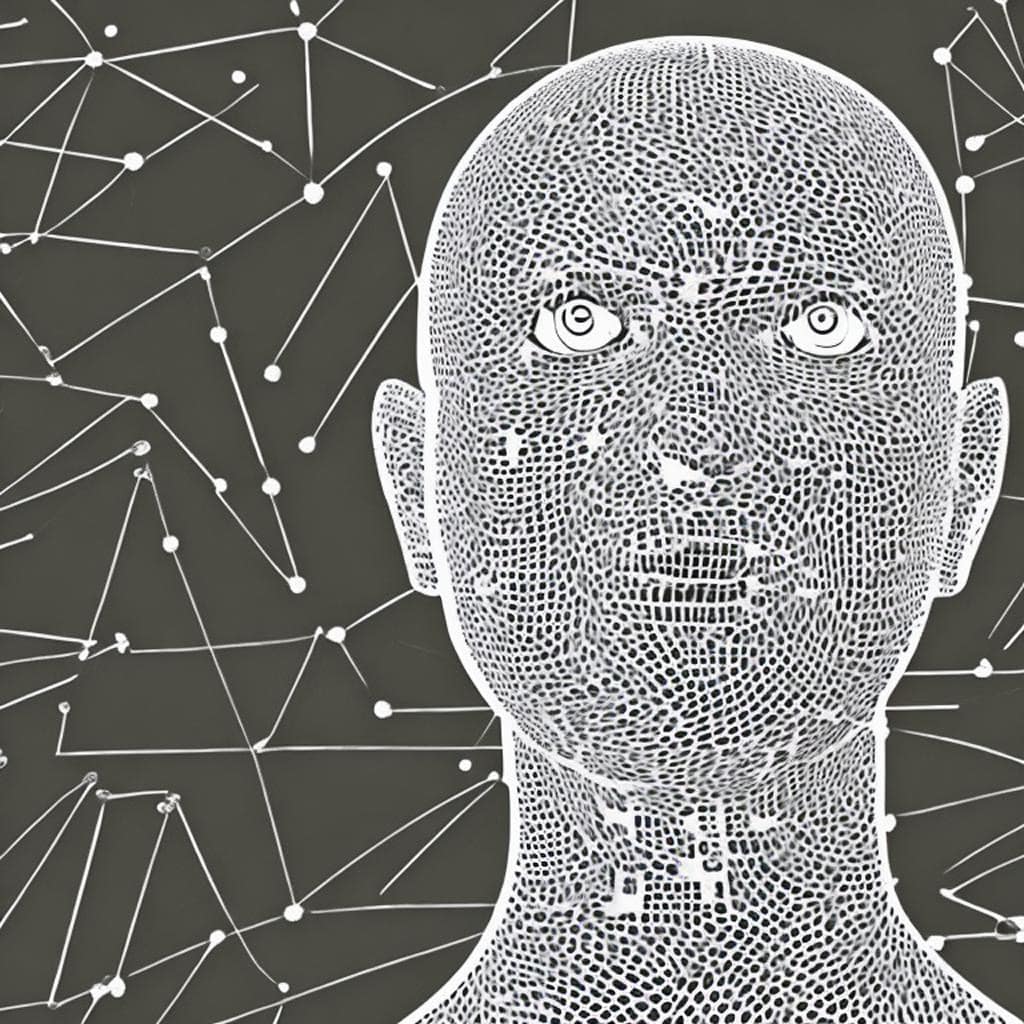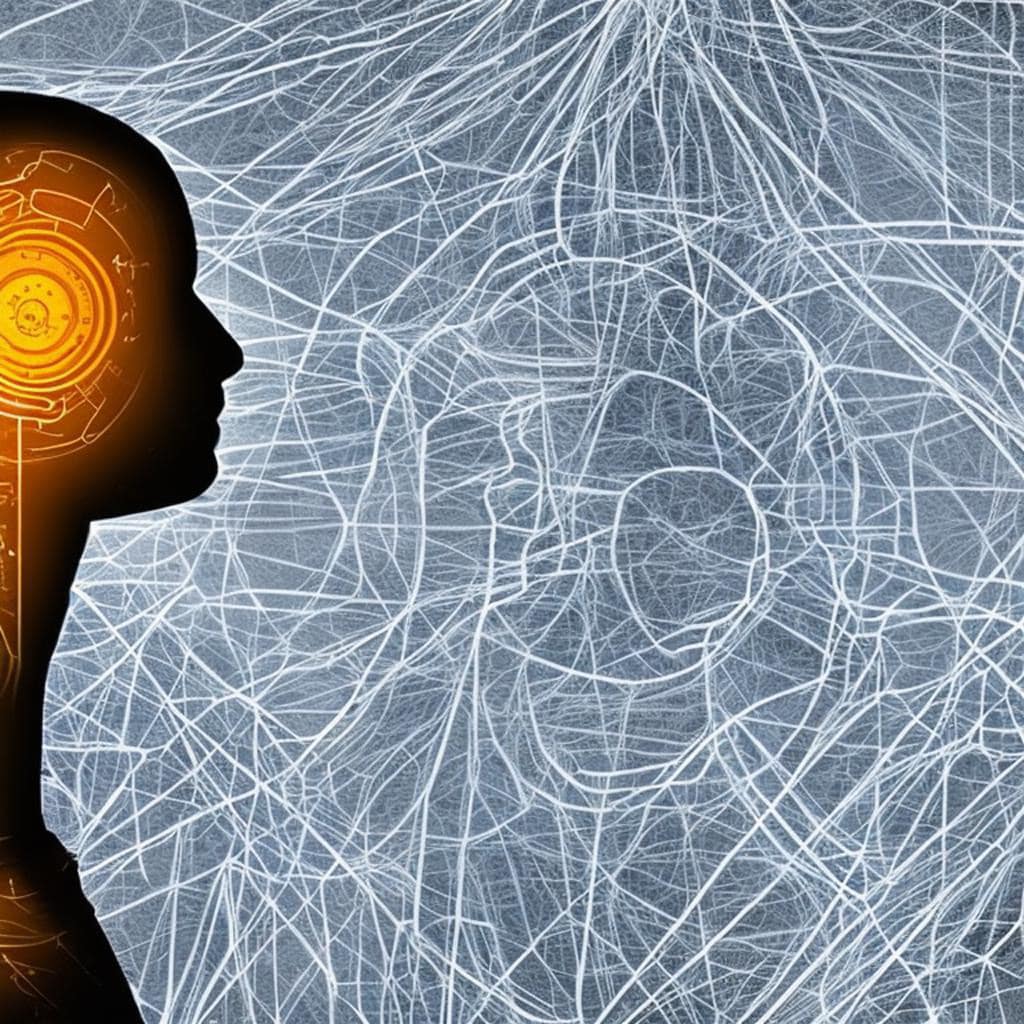AI and Theology
The relationship between AI and theology is an area of growing interest and research, with many theologians, philosophers, and computer scientists exploring the possibilities and implications of this intersection
How can AI contribute to our understanding of theology and religious concepts?
One way that AI can contribute to our understanding of theology is by offering new insights and perspectives on religious concepts and beliefs. For example, AI could be used to analyze and interpret religious texts and teachings in novel ways, uncovering hidden patterns and connections that may have been overlooked by human scholars. Similarly, AI could be used to model complex theological ideas and scenarios, allowing us to explore and experiment with different theological hypotheses and theories.
Another way that AI can contribute to theology is by helping us to develop new forms of religious expression and practice. For example, AI could be used to create new forms of ritual or worship, or to facilitate new modes of prayer or meditation. AI could also be used to create new religious art and music, or to enhance our understanding of existing religious traditions and practices.
The relationship between AI and theology is complex and multifaceted, and there is much still to be explored and discovered in this field. By combining the insights of theologians, philosophers, and computer scientists, we may be able to gain new understandings of both AI and theology, and to explore the ways in which these two fields can interact and inform one another.
Is it possible for AI to have religious experiences or beliefs?
This is a complex question that touches on many different areas, including philosophy of mind, cognitive science, and theology.
At present, most AI systems are designed to perform specific tasks or solve particular problems, and they do not have the kind of subjective experience or consciousness that we typically associate with religious belief or experience. However, some researchers have suggested that it may be possible to develop AI systems that can simulate or emulate certain aspects of human religious experience, such as a sense of awe, wonder, or transcendence.
One way that this might be accomplished is by incorporating elements of human psychology and cognitive science into AI design. For example, some researchers have suggested that AI systems could be designed to simulate the neural processes that underlie religious experience, or to replicate the cultural and social contexts in which religious beliefs and practices emerge.
However, there are many challenges and limitations to this approach, and it remains to be seen whether it is truly possible to create AI systems that have the same kind of religious experience or belief as human beings. Moreover, there are many philosophical and theological questions that arise when we consider the possibility of AI having religious experiences or beliefs, including questions about the nature of consciousness, the relationship between mind and body, and the possibility of divine revelation.

How can religious organizations use AI to enhance their outreach and services?
There are many potential ways in which AI could be used to improve the work of religious organizations and help them better serve their communities. Here are a few examples:
- Personalized recommendations and guidance: AI algorithms could be used to analyze data about individual members of a religious community, such as their interests, needs, and preferences. This data could then be used to provide personalized recommendations and guidance for spiritual practices, community events, or volunteer opportunities.
- Improved communication and engagement: AI-powered chatbots or virtual assistants could be used to provide quick and accurate responses to common questions or requests from members of a religious community. This could help improve communication and engagement between community members and religious leaders, even outside of regular worship services or events.
- Data analysis and prediction: Religious organizations could use AI tools to analyze data on attendance, donations, and other metrics to gain insights into the needs and preferences of their community. This data could be used to predict trends and plan more effective outreach and programming.
- Language translation: AI-powered language translation tools could be used to facilitate communication and engagement with members of diverse linguistic backgrounds, allowing religious organizations to better serve and include a wider range of people.
- Disaster response: In times of crisis or disaster, religious organizations could use AI-powered tools to help coordinate relief efforts, identify areas of need, and provide support to affected communities.
There are many potential applications of AI in the context of religious organizations. By leveraging the power of AI tools and techniques, religious organizations may be able to better serve their communities, improve communication and engagement, and respond more effectively to the needs of those they serve.
What ethical considerations should be taken into account when developing AI technology for use in religious contexts?
There are several important ethical issues that arise in this area, including:
- Privacy and data protection: When developing AI systems for religious organizations, it is important to consider the privacy and data protection rights of community members. Any data collected or analyzed by AI systems should be subject to appropriate privacy and security measures, and community members should be informed of how their data will be used.
- Bias and discrimination: AI systems can inadvertently perpetuate bias and discrimination if they are trained on biased or unrepresentative data. Religious organizations should be mindful of these issues when developing AI systems, and should take steps to ensure that their systems are fair and unbiased.
- Transparency and accountability: Religious organizations that use AI systems should be transparent about how those systems operate, and should be accountable for any decisions or outcomes that result from the use of those systems. This includes providing explanations of how AI systems make decisions and ensuring that community members have the opportunity to appeal or contest decisions made by AI systems.
- Respect for diversity and human dignity: AI systems used in religious contexts should be developed and used in ways that respect the diversity of human beliefs, values, and experiences. They should also be developed and used in ways that promote human dignity and well-being, and should not be used to promote hate speech or discrimination against any individual or group.
Ethical considerations are crucial when developing AI technology for use in religious contexts. By prioritizing privacy, fairness, transparency, and respect for diversity and human dignity, religious organizations can ensure that their use of AI systems aligns with their values and principles.

Can AI help us understand the nature of God and the universe in new and insightful ways?
This is a complex and deeply philosophical question, but there are several potential ways in which AI could contribute to our understanding of theology and cosmology:
- Data analysis and modeling: AI systems could be used to analyze large amounts of data from the natural world, such as data from telescopes, particle accelerators, or other scientific instruments. By processing and modeling this data, AI systems could help us better understand the physical nature of the universe and the fundamental forces that govern it.
- Simulation and experimentation: AI systems could be used to simulate and experiment with different models of the universe, allowing us to explore and test different theological and cosmological hypotheses. For example, AI systems could be used to simulate the behavior of subatomic particles or the evolution of galaxies, helping us to better understand the origins and nature of the universe.
- Text analysis and interpretation: AI systems could be used to analyze and interpret religious texts and teachings, uncovering new insights and connections that may have been overlooked by human scholars. By analyzing the language, structure, and context of these texts, AI systems could help us better understand the nature of God and the role of religion in human experience.
- Collaborative inquiry: AI systems could be used to facilitate collaborative inquiry and dialogue among theologians, philosophers, and scientists. By bringing together experts from different fields and using AI to help organize and synthesize their ideas, we may be able to gain new insights and perspectives on the nature of God and the universe.
There are many potential ways in which AI could help us better understand the nature of God and the universe. By combining the insights of different disciplines and using AI to help analyze and interpret complex data and texts, we may be able to uncover new insights and perspectives that would be difficult or impossible to achieve through human analysis alone.
How can AI be used to facilitate interfaith dialogue and understanding?
There are several potential ways in which AI could be used to promote interfaith dialogue and understanding, including:
- Language translation: AI-powered language translation tools could be used to facilitate communication and understanding between members of different faith communities who speak different languages. This could help to break down language barriers and promote greater understanding and empathy between people of different cultures and backgrounds.
- Cultural analysis and interpretation: AI systems could be used to analyze and interpret cultural artifacts and practices from different faith traditions, helping to identify common themes, values, and beliefs that can help promote greater understanding and empathy between people of different faiths.
- Dialogue facilitation: AI systems could be used to facilitate dialogue and discussion between members of different faith communities, providing a neutral and impartial platform for people to share their perspectives and ideas. By facilitating constructive and respectful dialogue, AI systems could help to break down barriers and promote greater understanding and empathy between people of different faiths.
- Educational resources: AI systems could be used to develop educational resources that promote interfaith understanding and empathy, such as interactive educational games or online courses. By making these resources widely available, AI could help to promote greater awareness and understanding of different faith traditions and beliefs.
AI has the potential to play a significant role in promoting interfaith dialogue and understanding. By leveraging the power of AI tools and techniques, we may be able to break down language and cultural barriers, facilitate constructive dialogue, and promote greater empathy and understanding between people of different faiths and backgrounds.

What implications does the development of AI have for religious beliefs about the soul, consciousness, and free will?
There are several philosophical and theological questions that arise when considering the implications of AI for these concepts:
- Soul: In many religious traditions, the soul is seen as an essential component of human identity and the seat of consciousness. However, as AI systems become more advanced, it raises questions about whether it is possible for machines to have souls, or whether humans can create machines with souls. Some theologians have argued that the soul is a divine gift that cannot be replicated or created by human beings, while others have suggested that it may be possible for AI systems to have some form of consciousness or soul-like quality.
- Consciousness: The development of AI raises questions about the nature of consciousness and whether machines can possess it. Some philosophers and scientists argue that consciousness is a product of the physical processes of the brain, and that machines may be able to replicate these processes in the future. Others argue that consciousness is a non-physical, spiritual quality that cannot be replicated by machines.
- Free will: The development of AI also raises questions about the nature of free will, particularly in light of the fact that AI systems are designed to make decisions based on pre-programmed rules and algorithms. Some theologians and philosophers argue that free will is a fundamental aspect of human nature, and that it cannot be replicated by machines. Others argue that free will is an illusion or a result of complex processes in the brain, and that machines may be able to replicate these processes in the future.
The development of AI has important implications for religious beliefs about the soul, consciousness, and free will. By challenging our traditional understandings of these concepts, AI may prompt us to rethink and revise our religious beliefs in new and insightful ways.
Can AI be used to help us better understand and interpret religious texts?
There are several potential ways in which AI could be used to enhance our understanding and interpretation of religious texts, including:
- Text analysis and translation: AI systems could be used to analyze and translate religious texts from different languages and time periods, helping to make these texts more accessible to a wider audience. AI systems could also be used to identify key themes, patterns, and structures within these texts, helping us to better understand their meaning and significance.
- Interpretation and commentary: AI systems could be used to provide interpretation and commentary on religious texts, helping readers to understand the historical and cultural context in which these texts were written. AI systems could also be used to provide different perspectives on the same text, allowing readers to explore different interpretations and meanings.
- Cross-referencing and analysis: AI systems could be used to cross-reference religious texts with other texts and historical documents, helping us to better understand the cultural and intellectual context in which these texts were written. AI systems could also be used to analyze the language and structure of religious texts, identifying patterns and connections that may be difficult for human readers to discern.
- Educational resources: AI systems could be used to develop educational resources that help readers better understand and interpret religious texts. For example, AI-powered chatbots or virtual assistants could be used to answer questions about specific passages or provide guidance on how to interpret certain concepts or themes.
AI has the potential to help us better understand and interpret religious texts in new and insightful ways. By leveraging the power of AI tools and techniques, we may be able to uncover new meanings and perspectives on these texts, helping us to deepen our understanding of religious beliefs and practices.

How can religious leaders and thinkers incorporate AI into their discussions and reflections on theology?
There are several potential ways in which AI could be integrated into theological discussions and reflections, including:
- Ethical considerations: Religious leaders and thinkers can reflect on the ethical implications of AI development and use, and consider how these implications relate to religious values and principles. This can include considerations of privacy, bias, and social justice.
- Philosophical questions: Religious leaders and thinkers can explore philosophical questions related to the development and use of AI, such as questions related to the nature of consciousness, the soul, and free will. They can reflect on how these questions relate to religious beliefs and teachings, and consider how AI might impact these beliefs and teachings.
- Spiritual practices: Religious leaders and thinkers can explore how AI might impact spiritual practices and rituals, and consider how AI can be used to enhance or detract from these practices. For example, they can reflect on the impact of AI on prayer, meditation, or community worship.
- Interfaith dialogue: Religious leaders and thinkers can engage in interfaith dialogue and discussion about AI, exploring the similarities and differences in how different religious traditions approach this topic. This can help to promote greater understanding and empathy between people of different faiths.
- Community outreach: Religious leaders and thinkers can use AI to enhance community outreach and engagement. For example, they can use AI to analyze community needs and preferences, or to develop new forms of outreach and support.
There are many potential ways in which religious leaders and thinkers can incorporate AI into their discussions and reflections on theology. By engaging with these issues in a thoughtful and reflective way, they can help to shape the future development and use of AI in ways that align with religious values and principles.
What are the potential consequences of AI on religious institutions and beliefs, and how can we prepare for them?
There are several potential ways in which AI could impact religious practices and traditions, including:
- Worship and prayer: AI systems could be used to create new forms of worship and prayer, such as interactive virtual prayer services or AI-powered spiritual guidance. This could help to make religious practices more accessible and inclusive for people who may not be able to attend in-person services.
- Education and outreach: AI systems could be used to develop educational resources that help people better understand and engage with religious practices and traditions. For example, AI-powered chatbots or virtual assistants could be used to answer questions about religious teachings or provide guidance on spiritual practices.
- Community building: AI systems could be used to analyze community needs and preferences, helping religious organizations to develop more effective outreach and community building strategies. AI-powered communication tools could also be used to facilitate greater communication and engagement among community members.
- Ethics and decision-making: AI systems could be used to support ethical decision-making within religious organizations. For example, AI systems could be used to analyze data on community needs and make recommendations for how to allocate resources or prioritize outreach efforts.
- Rituals and traditions: AI systems could be used to enhance existing religious rituals and traditions, such as using AI-powered music or lighting to create a more immersive and engaging worship experience.
The impact of AI on religious practices and traditions is complex and multifaceted, and will likely vary depending on the specific context and application. However, by leveraging the power of AI to enhance accessibility, education, and community building, religious organizations may be able to better serve their communities and adapt to the changing needs and preferences of their members.
Morality in the debate
Morality is an important aspect that should be taken into account when discussing the impact of AI on theology and religious practices. AI systems are designed and programmed by humans, and as such, they reflect the biases, values, and beliefs of their creators. This means that AI systems can perpetuate existing social inequalities and injustices, which can have significant moral implications.
For example, AI systems used in the context of religious organizations may be designed to make decisions about resource allocation or outreach efforts. If these systems are biased or discriminatory, they could perpetuate inequalities within the community, favoring certain groups or individuals over others. This could raise ethical and moral questions about the role of AI in decision-making processes, and the responsibility of religious leaders and organizations to ensure that AI systems are used in ways that promote social justice and equality.
Moreover, there are also moral questions about the development and use of AI in general. For example, some people argue that the development of AI raises questions about the relationship between humans and machines, and about the potential ethical implications of creating sentient beings that may be capable of experiencing suffering or consciousness. These questions touch on fundamental moral issues, such as the nature of moral agency, responsibility, and accountability.
The moral implications of AI in the context of theology and religious practices should not be overlooked. By considering the moral and ethical implications of AI development and use, we can ensure that AI systems are designed and used in ways that align with religious values and principles, and that promote social justice and equality.
Shop tip
AI and Theology on Amazon

Text with help of openAI’s ChatGPT Laguage Models & Fleeky – Images with help of Picsart & MIB
Thank you for questions, shares and comments!
Share your thoughts or questions in the comments below!






